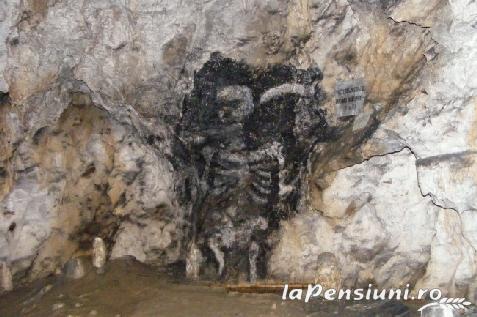

Polovragi Monastery is situated in a picturesque setting at the foot of Stone Polovragilor (Parang Mountains), near the gorges, in an orchard with fruit and chestnut trees, 100m from pensiune.Recentele historical research established the monastery age Polovragi around year 1505, being founded Radul and four sons of Danciul Zamona, contained in a decree issued on January 18, 1480 by Prince Basarab the Young. For a century and a half, the documents do not mention anything about the monastery. In 1645, the village becomes the property Polovragi Danciul Pīrīianul chancellor's son Hamza. He built on the plateau Polovragilor a place of worship on the foundations of already existing for rest and prayer and soul for refuge in case of danger and shelter. The first document of its result from a decree issued on July 6, 1648 by Matei Basarab, which confirm its ruler village of the same name given by the founder. Dedicated Holy Sepulchre of the second founder of the monastery or redeemed by Prince Constantin Brāncoveanu subdued in 1693 and made the monastery Hurez. During his painted inside brāncovenesc style porch was added, were built some cells and bell tower and fortress walls.
"Gorges" imposing appear in front of you as you come to the house. Seated behind the monastery, you feel like there is hidden wisdom all Dacia. Access is on the right path while Monastery and you get closer, you outward splendor. On the one hand, and the other walls drill dozens of "caves" if you crush and I invite you to wander incessantly. Oltetul that made its way through these walls, meets proverb "as small stump, fell great oaks" .. - But so frail and still houses hundreds of trout in it.
"The cave" comes your right after you go there a 10 minutes through gorges. This cave is something rare in Europe - as long as it is beautiful. Still not enough to know all the cave but resit to cross about 10km. Now do not worry - the general public is only 900m visits
(Translated with Google Translate)
Services
- Vegetarian Menus
- Children's menu
- Local cuisine
- Tastings / Food events
- Nature Reserves
- Artistic and historical sites
- Churches and monasteries
- Hiking
- Horse riding
- Mountain bike

